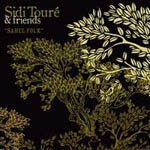Sidi Touré grew up in Gao, once the center of the flourishing Songhaï Empire (15th and 16th centuries). But by his early days in the '60s and '70s, times were a changin’, and in addition to the praise songs sung to his noble ancestors, Sidi bent his ear to balladeers from abroad, including J.J. Cale and Kenny Rogers. He also wore a leather jacket and sported a maverick persona in tune with the times. But like Salif Keita and Ali Farka Toure, Sidi had to transgress caste tradition to become a musician. (Nobles are not to sing, but to be sung about.) Sidi’s older brother used to actually break his instruments, but the young man was not dissuaded. In ’76, at age 17, Sidi became the youngest member of Gao’s regional orchestra, the Songhai Stars. At first, he had to sing songs in Bambara, the dominant language in the Malian south, but eventually Sidi won prizes for his own Songhai language songs, and earned himself a place of respect across the Malian north.
Keen collectors may recall Sidi’s 1996 electric release, Hoga (Stern’s Africa), his only other title on the international market, and one he says he was never properly paid for—but that’s another story. The set of nine songs on Sahel Folk, recorded simply at his sister’s house in Gao, presents a more intimate, folksy side of his musical persona. It sounds closer to the simplest, acoustic recordings of Ali Farka Toure, or Ibrahim Hamma Dicko, the late, great troubadour of Gao. The mood is warm and inviting here, the grooves friendly and tumbling, with precise, resonant string picking and no real percussion, save the tap of fingernails on the taut, dry skin of a traditional lute, either the kurbu or kuntigui.
Each of these songs is a duet with one of five accompanists. “Bon Koum” and “Haallah” are guitar duos, the former lilting and melodious the latter droning and trancy. “Bera Bat Wassa (Honor Goes Strait to his Heart)” hews to a dark pentatonic mode, buoyed by the delicious chatter of kurbu and acoustic guitar. “Taray Kongo (Moonlight Song)” rolls out a gentle Songhai rhythm, a cousin of the famous takamba, with the prickly notes of the high-pitched melodies and dry fingernail-to-skin tapping of the kuntigui creating the throughline for a sublime 9-minute meditation. Touré’s accompanists sing at times, but mostly, he holds forth in his clear, vibratoless tenor, refreshingly unadorned with either personal affectation or studio processing.
Sahel Folk is more laid back than the seething desert rock of Tinariwen, Vieux Farka Touré, Tidawt or Tamikrest. It offers more singer-songwriter fare than releases by the rootsier desert groups like Tartit or Etran Finatawa. Yet all of these are part of the “desert blues” continuum, ever more in fashion with rock and folk musicians everywhere these days. Kudos to the eclectic Thrill Jockey label for taking a chance on an artist with little name recognition and plenty of competition. Sidi Touré is the real thing—sincere, authentic and gifted. With this release, he establishes a place in what may be the fastest growing Afropop subgenre of our day.
-Banning Eyre








